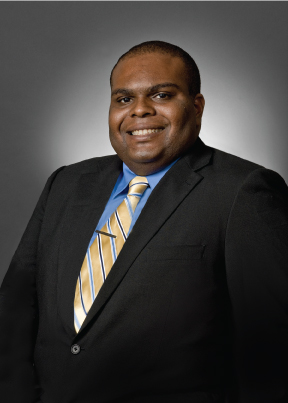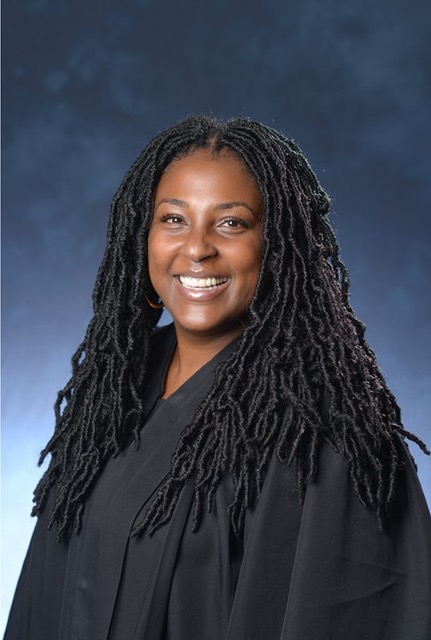
Destination Law School Volunteers Hold the Door Open
for Generations to Come
Susan Kostal
It’s easy to see why Destination Law School is one of Marvin Anderson’s passions, and the focus of one of his top four initiatives for his tenure as president of the Bar Association of San Francisco (BASF) and the Justice and Diversity Center (JDC).
For more than 10 years, volunteers have been going to local Bay Area colleges to demystify the law school application process and show students of color and those from underrepresented communities that the legal profession not only has room for them, but wants them.
Founded in 2008 by Yolanda Jackson, executive director of BASF/JDC, the program gives students intimate access to judges and attorneys who look like them by hosting panel discussions at their institutions. In hearing their stories, they can envision more options for themselves.
This year, JDC is raising funds to supply 10 to 15 students with scholarships for LSAT prep courses, which can cost $1,500 or more, along with mentoring, coaching, and a two-day boot camp June 11-12.
“I am passionate about the power of education, and diversifying the legal profession,” said Anderson, assistant vice president—senior legal counsel with AT&T in San Francisco. “The law school admissions process is kind of a mystery if you don’t know anyone who has gone through it before. That’s why I devote time and energy to this pipeline program, and want to further build out our infrastructure to facilitate that.”
This year, JDC is raising funds to supply 10 to 15 students with scholarships for LSAT prep courses, which can cost $1,500 or more, along with mentoring, coaching, and a two-day boot camp June 11-12. The purpose of the program is to transform student’s interest and excitement into action so that they have one-on one support and accountability to follow through on their desires to go to law school and ultimately change the world.
Samantha Akwei, JDC's diversity and pipeline programs director, oversees JDC's diversity programs, including the School-to-College program, Law Academy, and the Bay Area Minority Law Student Scholarship program, to name a few. “We want to expose diverse candidates to how they can have an active role in shaping the law and help them access the many resources that are available to them through the bar and beyond,” Akwei said.
Students get access not only to diverse local attorneys, judges, and law school admissions officers, but they also receive a detailed toolkit that walks them, step-by-step, through the admissions process, and shares tips on how to tailor their undergraduate experience to optimize their chances as a law school applicant. Local law school sponsors of this program have included Golden Gate, USF, Southwestern, Chapman, UC Davis, UC Hastings, and McGeorge.
“Often when communities of color think of the law, they think of negative ramifications they have experienced,” Akwei said. These programs help change that perception and give candidates the courage, tools and hands-on guidance as they go through the law school application and admissions process.
Although the pandemic halted in-person panels at local colleges and universities, volunteers like Antonio Ingram, a litigation associate at Boies Schiller in San Francisco, and San Mateo County Superior Court Judge Amarra Lee, can’t wait to get back on campuses. Both Antonio Ingram and Judge Lee were law students in JDC’s Bay Area Minority Law Student Scholarship Program.

Ingram grew up in the inner city and is a first-generation college and law school graduate. “I don’t think I met a lawyer until I was halfway through college. There just weren’t lawyers in my community,” he said. “In California, only three percent of barred attorneys are African American. If I can do it, you can do it. There are Black and Brown people who can excel.”
He shares his experience not only as a Black man, but also as a member of the admissions committee at Berkeley Law when he was a student there. He knows firsthand what admissions officers are looking for. “I was a religious studies major. You don’t need to be in a pre-law curriculum, or in political science, economics, or history—as long as a major is giving you vigorous preparation in critical thinking, reading, and writing.”
Ingram also shares how students who may want to go to law school to give back to their communities and champion social justice can find positions to reach those goals, and fight what he has called the “large law firm herd mentality” that sometimes takes over one’s law school experience.

Judge Lee grew up in Los Angeles. She was raised by her grandmother, and remembers sitting with her, “the strongest person I know,” as she cried during a hearing for her uncle, who struggled with drugs and was in and out of the criminal justice system. “I felt the power of that courtroom,” she said. But reaching law school was going to be tough. She wasn’t eligible for private loans but qualified for JDC's three-year Bay Area Minority Law Student Scholarship. “Money is the final determinant of law school. Absent JDC, I couldn’t afford UC Hastings or anything else.”
Ingram and Lee are regulars at the Destination Law Schools panels, they said, because others paved the way for them. “You get so inspired when you are around these students. To see them, their bright eyes, when they have the confidence and take off, it inspires you to do more. You are holding the door open for generations to come.”
Appointed in 2018 at age 37, Lee is the first African American woman on the San Mateo County Superior Court bench. She is also the first JDC scholarship recipient to make it to the bench. “There is a tremendous amount of responsibility that comes with being first,” she said. “There are a number of women who poured so much into me to get me here, and I want to make sure before my time is up that we are not dealing with ‘first’ anymore, but other pressing issues.”
Lee said some of her most rewarding mentee relationships have been with those she has met via similar panels—students of color and first-generation college graduates. Their successes help get her through days when she battles assumptions and microaggressions. “When people think you are the court reporter, it wears you down, day to day. But every time I participate on a panel, I get just as much from the students as we are giving to them.”
JDC is recruiting attorneys as volunteers and also fundraising for LSAT scholarships. Individuals interested in making a donation can visit JDC’s donation page. Enter an amount and select 'Diversity Pipeline Programs.' In the box labeled “Other,” specify your donation by writing: 'LSAT Prep Scholarship.' You may also learn more about the two-day workshop here and contact Akwei at sakwei@sfbar.org to become a volunteer.
Susan Kostal is a longtime legal affairs journalist. Based in San Francisco, she now serves as a writer and editor for lawyers and law firms. Most recently she served as Associate Director for News & Information at UC Hastings Law.
